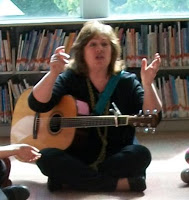Become Bar/Bat Mitzvah at BIJ
Enduring Understandings of Jewish Learning
Education at BIJ focuses on enduring understandings, or “big ideas.” These enduring understandings help guide the content and methods used in our classrooms and in planning our programs.
The B3 Program curricula introduce children and their families to our rich culture; Jewish history, holidays and symbols; prayer; Torah; and the values of the Jewish people. It is our hope that students will gain the tools necessary to enable them to continue to study, grow, question and participate actively in Jewish life in the coming years.
The enduring understandings focus on three pillars of Judaism, the Jewish values of Torah, Avodah (sacred work), and G’milut Chasadim (acts of kindness). Our faculty also teaches about Israel and holidays; their passion makes classes exciting. Each year, students build on their previous knowledge, which establishes the foundation for a lifetime of Jewish learning.
Torah
- Studying Jewish texts allows us to explore our relationship with God and reflect on the ways God is continuously revealed to others and to ourselves.
- My life is reflected in and reflects Torah.
Avodah
- Prayer can help me grow through personal reflection, can increase my connection to the Jewish people, and can strengthen my relationship with God.
- The message and power of Jewish prayer can help me understand and define myself as an individual and as an authentic member of the Jewish community.
G’milut Chasadim
- We are all part of K’lal Yisrael and have a responsibility to actively support and sustain the Jewish community through acts of g’milut chasadim.
- We can experience God in our world, in others and within ourselves by engaging in acts of g’milut chasadim.
- Our development as emerging Reform Jewish adults and authentic members of the Jewish community is closely linked to our ethical behavior (middot) and the performance of acts of g’milut chasadim.
Program Components and Requirements
Youth Education
Students must attend our B3 Program for a minimum of 2 years before becoming Bar/Bat Mitzvah. They are expected to continue attending for the duration of the year in which their ceremony is celebrated, and beyond. Formal Hebrew instruction begins in Grade 4 and continues until just prior to the Bar/Bat Mitzvah. It is our sincere hope that after becoming Bar/Bat Mitzvah, students will continue their Jewish education in our teen program.
We utilize the CHAI Curriculum: Learning for Jewish Life, published by the Union for Reform Judaism. This curriculum offers a wealth of supporting material including family education programs, online learning and reinforcement, connections to other schools and teachers working on the same material – the list goes on! Please speak with the Director of Education if you have questions about the CHAI curriculum.
Hevruta Hebrew
In small study groups of 3-5 students, our children learn and explore the Hebrew language. To explore Hebrew while acquiring the skills to participate and lead tefillah for our congregation, and in addition to our experienced and dedicated faculty, we utilize the Shalom Uvrachah and Kol Yisrael Hebrew text books from Behrman House. Our students learn to read Hebrew and enjoy a sense of accomplishment as they progress through a series of well-organized and stimulating exercises with an integrated online/computer component for home reinforcement.
The enduring understandings of this curriculum are:
- Prayers and rituals teach us about Jewish values and mitzvot.
- When we know how to recite prayers, and what they mean, we feel like a participating member of our Jewish community.
Required Hebrew prayers include in Grades 6 and 7 include:
| Prayers | Concepts Introduced and Reinforced |
| Torah blessings | Blessing Formula; P’tichah/Chatimah; Chosen People; Giving of the Torah |
| G’vurot | Miracles; Creation; Faith |
| Amidah overview | Am Yisrael; Peace; Eretz Yisrael |
| Aleinu | Names/Attributes of God; Thanks and Praise; Chosen People; Messiah |
| Kaddish, Chatzi Kaddish | Names/Attributes of God; Thanks and Praise; Holiness; L’olam va-ed; Minyan; Faith |
| Torah service | Names/Attributes of God; Giving of the Torah; Eretz Yisrael |
| Haftarah blessings | Names/Attributes of God; Thanks and Praise; Blessing Formula; P’tichah/Chatimah; Holiness; Faith |
Initial Assessment
During the Hevruta Hebrew years, each student will be individually assessed in their Hebrew acquisition and familiarity with specific prayers. When a child has mastered the content of the Blessing Formula, Shabbat Kiddush, Yotzer Or, Ma’ariv Aravim, Shema and V’ahavta, they will be individually assessed and then invited to choose a date to become Bar/Bat Mitzvah at least one year later. We expect students to master these prayers during the 5th Grade year, but everyone learns at the pace that is right for them. The purpose of these benchmarks is to ensure that we are not asking too much of our students as they prepare to become members of the adult Jewish community.
Training with the Cantor or Tutor
Following successful mastery of the initial assessment and approximately nine months before the Bar/Bat Mitzvah service date, each student will begin working with either the Cantor or a tutor. Each student will receive a maximum of 36 half-hour lessons of individual instruction. If additional sessions are deemed necessary, there may be a small fee assessed to the family. A recording device may be brought to these sessions and other written or audio materials will be assigned and distributed by the Cantor or tutor. In conjunction with these lessons students are asked to study at home using printed materials and recordings. Regular attendance at Shabbat services and Torah Study with parents reinforces learning through participation.
Outcomes of Training Sessions
- Minimum of 3 aliyot plus maftir with a maximum of 7 Torah aliyot plus maftir to be chanted from the Torah using the traditional cantillation. (At BIJ, maftir is not the 7th aliyah.) Torah aliyot will be taught in the following order:
-
- Maftir: Bar/Bat Mitzvah always chants.
- Penultimate: The blessings over the Torah reading before the Maftir is usually reserved for the parents of the Bar/Bat Mitzvah. Therefore the child reads the corresponding verses of Torah.
- Rishon (1st Aliyah): The honor of chanting the first Torah reading is given to the Bar/Bat Mitzvah.
- Remaining Aliyot: Chanted by Bar/Bat Mitzvah, family members or friends. Family, friends and BIJ members may fulfill the mitzvah of chanting the second and third (and any additional) aliyot.
- Haftarah portion (minimum of 5 verses)
Family Education Workshops
Family educational workshops take place each year on Sunday mornings; dates and topics are announced in the Fall. Students are required to attend all of these events in Grades 6 and 7, with at least one parent. We hope these workshops will be enriching and meaningful experiences for child and parent alike. Topics have included:
- Torah Study: Owning Your Parashah and Making Midrash
- Keeping the Mitzvah in Bar/Bat Mitzvah
- Tzedakah: What Does ‘Justice’ Have to Do with It?
- Tallit, Kippah, Tzitzit and Tefillin (Getting Familiar with Jewish Ritual Garb)
- Interfaith Family Concerns and the Bar/Bat Mitzvah Process
- The Magic of Shabbat
- Tikkun Olam / Changing the World
There may be a Shabbaton (retreat) for Bar/Bat Mitzvah students and their families which will take place in the beautiful setting of one of the Jewish camps in Northern California.
Al Shloshah Devarim Program
Pirke Avot, the teachings of our ancestors, teach us that just as a chair needs three legs on which to stand, so does the world.
עַל שְׁלשָׁה דְבָרִים הָעוֹלָם עוֹמֵד, עַל הַתּוֹרָה וְעַל הָעֲבוֹדָה וְעַל גְּמִילוּת חֲסָדִים:
Al shloshah devarim haolam omed: al haTorah, v’al ha’Avodah, v’al G’milut Chasadim.
The world stands on three things: on Torah, prayer, and loving acts of loving kindness.
Each student will receive a booklet in which he/she will reflect on their experiences in each of these pillars of Judaism.
Expectations
Torah: Text Study
- Students will study Torah as part of the regular Youth Education Program.
- Similarly, Shabbat morning Torah Study is highly advised for both students and parents beginning in Grade 6. As students are increasingly able to handle sophisticated inquiry and critical thought, they will be welcomed into our wonderful community of lifelong learners who study together every Shabbat morning before services.
- Each child will study his/her assigned Torah portion in preparation for writing and delivering a D’var Torah.
- Each student will reflect on their Torah study and traditional Jewish teaching. Evidence of your Torah study will be demonstrated through writing and delivering your D’var Torah when you become Bar/Bat Mitzvah.
Avodah: For the prayer section
- Each student will attend Shabbat services during the year. At each service they will hand one of their personalized cards to the Rabbi or service leader.
- Shabbat or holiday service requirements for 4th and 5th graders:
- Attend 8 Shabbat services each year, at least 3 must be on Shabbat morning
- Starting in the 6th grade, you are expected to attend Shabbat and holiday services on a regular basis. Whenever possible, families should attend services together. You should turn in one of the service attendance cards to the rabbi or cantor at BIJ each time you attend a service. You must also complete a reflection page for two services that you attend (one in 6th grade and one in 7th grade).
- Shabbat or holiday service Requirements for 6th and 7th graders:
- Attend 13 Shabbat services each year, at least 6 must be on Shabbat morning
G’milut Chasadim: Acts of loving kindness
- Each student will engage in a mitzvah project of their choosing. More information can be found in the Al Shloshah Devarim Program booklet.
Meetings with the Rabbi
- After successfully reaching the benchmark testing (outlined above) and the setting of a Bar/Bat Mitzvah date, a “Get to Know You” meeting with the Rabbi will be scheduled.
- Follow up meeting immediately before tutoring with Cantor/tutor begins.
- Receive a translation of your Torah portion with commentaries
- Schedule four 45-minute study sessions with the Rabbi
- Set a rehearsal date for the week prior to the service
- Four individual lessons to study your Torah portion and brainstorm ideas for writing the Dvar Torah. Ongoing email communication with the Rabbi during the writing and editing process.
- List questions about Torah portion
- Summarize Torah portion
- Draft of D’var Torah
- Thank yous
- Bar/Bat Mitzvah rehearsal several days before the service.
Each session with the Rabbi builds upon a foundation laid during the previous session. For this reason, students are expected to arrive with all assignments completed and emailed to the rabbi the night before.

 Our goal is to strengthen Jewish identity, continuity and our youth’s relationship to the people and land of Israel. Whether is it through a summer teen trip to Israel or a session at a Jewish residential camp, our Congregation encourages all teens to “Do Jewish” during the summer!
Our goal is to strengthen Jewish identity, continuity and our youth’s relationship to the people and land of Israel. Whether is it through a summer teen trip to Israel or a session at a Jewish residential camp, our Congregation encourages all teens to “Do Jewish” during the summer!
 Brianna Brostoff grew up in southern California, active at Temple Aliyah. She attended LA Hebrew High and Camp Hilltop in the summer. After participating in Young Judea’s Year Course, Brianna came to San Francisco and quickly jumped into active involvement in the Jewish community. She has been a Masa Israel Intern and Koret Intern at SF Hillel, when she is not studying sociology at SF State University. After a successful year teaching in our Hevruta Hebrew Program, Brianna is very excited to teach our first-third graders in our Sunday Morning Program this year!
Brianna Brostoff grew up in southern California, active at Temple Aliyah. She attended LA Hebrew High and Camp Hilltop in the summer. After participating in Young Judea’s Year Course, Brianna came to San Francisco and quickly jumped into active involvement in the Jewish community. She has been a Masa Israel Intern and Koret Intern at SF Hillel, when she is not studying sociology at SF State University. After a successful year teaching in our Hevruta Hebrew Program, Brianna is very excited to teach our first-third graders in our Sunday Morning Program this year! Adam Jenkins is a junior at Terra Nova High School in Pacifica. Adam’s favorite subject is chemistry (he likes blowing things up…safely, of course). He also plays the alto saxophone in the school marching, concert, and jazz bands, and has been playing piano since he was ~8 years old. When not at school or at a band function, Adam enjoys playing computer games, spending time with his dog, or pestering his little brother. He has also traveled extensively within Europe and Israel. Although not especially religious when it comes to a belief in the Almighty, Adam values Jewish history, community, and culture…and the food, of course. (He’s a big fan of honey cake.) If you ever hear someone playing piano when they’re supposed to be in YAFE or after services are over, it is probably Adam.
Adam Jenkins is a junior at Terra Nova High School in Pacifica. Adam’s favorite subject is chemistry (he likes blowing things up…safely, of course). He also plays the alto saxophone in the school marching, concert, and jazz bands, and has been playing piano since he was ~8 years old. When not at school or at a band function, Adam enjoys playing computer games, spending time with his dog, or pestering his little brother. He has also traveled extensively within Europe and Israel. Although not especially religious when it comes to a belief in the Almighty, Adam values Jewish history, community, and culture…and the food, of course. (He’s a big fan of honey cake.) If you ever hear someone playing piano when they’re supposed to be in YAFE or after services are over, it is probably Adam.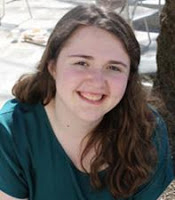 Gabby Kleyner lives in Pacifica with her parents and older sister, Victoria. Her family is from Russia and she is the first American-born member of the family. She is a junior at Jewish Community High School of the Bay. Her favorite classes are math, chemistry and sculpture. She is a member of the B.P. Fashion Board at Nordstrom and enjoys volunteering at the Hebrew Free Loan Association. During her free time she enjoys relaxing with friends, watching movies, painting and swimming. She is extremely grateful for the wonderful community at BIJ, specifically the amazing teachers and her incredible friends.
Gabby Kleyner lives in Pacifica with her parents and older sister, Victoria. Her family is from Russia and she is the first American-born member of the family. She is a junior at Jewish Community High School of the Bay. Her favorite classes are math, chemistry and sculpture. She is a member of the B.P. Fashion Board at Nordstrom and enjoys volunteering at the Hebrew Free Loan Association. During her free time she enjoys relaxing with friends, watching movies, painting and swimming. She is extremely grateful for the wonderful community at BIJ, specifically the amazing teachers and her incredible friends.  Leah Mills was born in San Francisco and has lived here all her life. She is a junior at Drew School and having a great time there. Her favorite classes are American Sign Language and Photography. She is interested in acting and was in The Good Doctor by Neil Simon at the New Conservatory Theater Center last year. Leah’s goals in life are to be fluent in sign language, invent a new jellybean flavor, and travel around the world. Last summer she travelled to Israel with Lily and Adam.
Leah Mills was born in San Francisco and has lived here all her life. She is a junior at Drew School and having a great time there. Her favorite classes are American Sign Language and Photography. She is interested in acting and was in The Good Doctor by Neil Simon at the New Conservatory Theater Center last year. Leah’s goals in life are to be fluent in sign language, invent a new jellybean flavor, and travel around the world. Last summer she travelled to Israel with Lily and Adam. David Morgenstern, Cantorial Soloist, tutors our B’nai Mitzvah students individually. David continues to share his passion for Judaism and love for Torah with our students as they prepare to become Jewish adults. He’s always willing to share pictures of his kitties, just ask him!
David Morgenstern, Cantorial Soloist, tutors our B’nai Mitzvah students individually. David continues to share his passion for Judaism and love for Torah with our students as they prepare to become Jewish adults. He’s always willing to share pictures of his kitties, just ask him!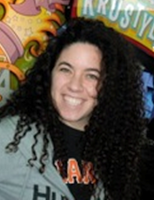 Shani Newman continues with us this year on Sunday Mornings with grades 6 & 7, and in Hevruta Hebrew! Shani lived in Israel from age 5 until she was 12, when she moved to Irvine, CA. She studies Math at SF State and looks forward to becoming a math teacher. She has also been an intern at SF Hillel and has spent many summers as a camper, counselor and Junior-CIT advisor at Camp Alonim, a Jewish overnight camp in Southern California. An avid Israeli folk dancer, she teaches Israeli dance at SF Hillel. Maybe she’ll even teach us!
Shani Newman continues with us this year on Sunday Mornings with grades 6 & 7, and in Hevruta Hebrew! Shani lived in Israel from age 5 until she was 12, when she moved to Irvine, CA. She studies Math at SF State and looks forward to becoming a math teacher. She has also been an intern at SF Hillel and has spent many summers as a camper, counselor and Junior-CIT advisor at Camp Alonim, a Jewish overnight camp in Southern California. An avid Israeli folk dancer, she teaches Israeli dance at SF Hillel. Maybe she’ll even teach us!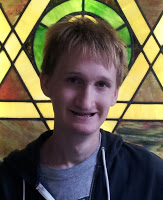 Adam Safford is 19, attends City College of San Francisco and lives at home with his family. He became Bar Mitzvah, was Confirmed at BIJ and is excited to be back on Sunday mornings after a two-year hiatus. In Adam’s spare time he enjoys playing video games, watching new episodes of his favorite TV shows, riding his bicycle and exploring the Bay Area. He loves to go to the beach or the park in his spare time and one of his favorite weekend hobbies is to take pictures of places he visits. Adam will be joining us on Sunday mornings as a role model for our students showing them one more way one can be involved and stay connected to BIJ. You may find him helping Neil, managing the Micha Mocha Café, running back-and-forth between BIJ and the Mercaz, in the classrooms, and helping out with all of our great activities!
Adam Safford is 19, attends City College of San Francisco and lives at home with his family. He became Bar Mitzvah, was Confirmed at BIJ and is excited to be back on Sunday mornings after a two-year hiatus. In Adam’s spare time he enjoys playing video games, watching new episodes of his favorite TV shows, riding his bicycle and exploring the Bay Area. He loves to go to the beach or the park in his spare time and one of his favorite weekend hobbies is to take pictures of places he visits. Adam will be joining us on Sunday mornings as a role model for our students showing them one more way one can be involved and stay connected to BIJ. You may find him helping Neil, managing the Micha Mocha Café, running back-and-forth between BIJ and the Mercaz, in the classrooms, and helping out with all of our great activities!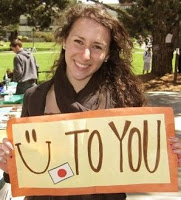 Dona Standel continues on BIJ’s faculty this year. The big news in her life is that she’s marrying a former BIJ faculty member: Jordan Hopstone. She’s finished her undergraduate studies at SF State and has also worked for SF Hillel. Dona is excited to continue sharing her love of Hebrew and enthusiasm for all-things-Jewish with the students (especially our teens in grades 8-10 and Hevruta Hebrew) and their families in the YAFE program!
Dona Standel continues on BIJ’s faculty this year. The big news in her life is that she’s marrying a former BIJ faculty member: Jordan Hopstone. She’s finished her undergraduate studies at SF State and has also worked for SF Hillel. Dona is excited to continue sharing her love of Hebrew and enthusiasm for all-things-Jewish with the students (especially our teens in grades 8-10 and Hevruta Hebrew) and their families in the YAFE program! Jamie Rafaela Wolfe is a product of 11 years of Jewish Day School education. She loved it so much she completed the DeLeT (Day School Leadership through Teaching) program through Hebrew Union College – Jewish Institute of Religion. Jamie also completed all the coursework for her California State Multiple Subject Teaching Credential. Jamie reads, writes, and speaks Hebrew and has lived in Israel. Jamie is taking a break from weekly teaching this fall, but we hope to welcome her back as a sub whenever possible!
Jamie Rafaela Wolfe is a product of 11 years of Jewish Day School education. She loved it so much she completed the DeLeT (Day School Leadership through Teaching) program through Hebrew Union College – Jewish Institute of Religion. Jamie also completed all the coursework for her California State Multiple Subject Teaching Credential. Jamie reads, writes, and speaks Hebrew and has lived in Israel. Jamie is taking a break from weekly teaching this fall, but we hope to welcome her back as a sub whenever possible!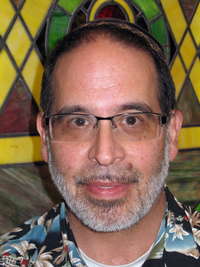 Neil Bronstein is appreciated for his friendly and welcoming face and can-do attitude. He is here to set up for services, provide security/logistics and to help afterwards. At the same time, he will likely ask about your health and give you a firm handshake.
Neil Bronstein is appreciated for his friendly and welcoming face and can-do attitude. He is here to set up for services, provide security/logistics and to help afterwards. At the same time, he will likely ask about your health and give you a firm handshake.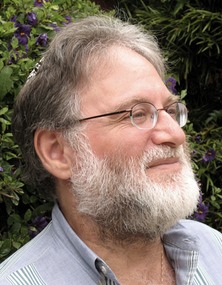 Rabbi Danny Gottlieb comes to us from Toronto, Canada, where he served the Canadian Reform Jewish community for more than 30 years, as a synagogue educator, director of the Canadian region of the Union for Reform Judaism, and most recently as rabbi of Temple Kol Ami in Thornhill, Ontario. He brings with him a love of Jewish life and Jewish learning, and a strong commitment to the synagogue as a sacred community.
Rabbi Danny Gottlieb comes to us from Toronto, Canada, where he served the Canadian Reform Jewish community for more than 30 years, as a synagogue educator, director of the Canadian region of the Union for Reform Judaism, and most recently as rabbi of Temple Kol Ami in Thornhill, Ontario. He brings with him a love of Jewish life and Jewish learning, and a strong commitment to the synagogue as a sacred community.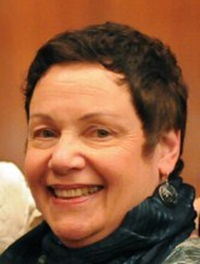 Sara Heckelman, Administrator, brings a big heart to her work as well as knowledge of the community through her years as a member of the congregation. Her father was a rabbi, so she’s very familiar with the day-to-day needs of a shul.
Sara Heckelman, Administrator, brings a big heart to her work as well as knowledge of the community through her years as a member of the congregation. Her father was a rabbi, so she’s very familiar with the day-to-day needs of a shul.